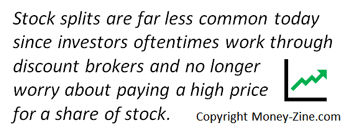In this article, we're going to explain two terms: stock splits and reverse stock splits. That explanation will include a brief definition of each term, their advantages and disadvantages, impact on dividends, as well as an example.
Stock Split Definition
A stock split is defined as an adjustment to the number of shares outstanding. If a company announces a 2 for 1 stock split, they're telling the investment community they will be supplying shareholders with two shares of stock for every one share owned.
Splitting a Stock
| Additional Resources |
| Short Selling Stocks Stop Loss Order Stock OptionsStock Accumulators Moneyness |
There are some very good reasons for a company to split its stock. As a stock rises in price over time, some investors may become unwilling to pay such a high price for each share. This is more of a psychological barrier than a value-based hurdle. By splitting a stock, a company hopes to entice more investors to purchase the company's securities. This is why many companies make announcements when the stock price approaches historical highs. The first step in the process usually involves gaining approval from the company's board of directors and / or shareholders. Once approved, the company will make a formal announcement, giving the exact date the split will occur. The holders of stock on this record date are entitled to the split in shares. There are several possible combinations, 2 for 1 and 3 for 2 being the most common splits. In a 2 for 1 stock split, the company is stating that it will have 2 shares outstanding for every 1 share currently issued.
Stock Split Example
Let's say Company A currently has 100 million shares outstanding, and the company announces a 2 for 1 split. Let's also assume that on the day before the split occurs, the company's stock closes at $50 per share. On the day of the split, the company will have 200 million shares outstanding, and the opening price should be around $25 per share. Note: The total market capitalization of the company does not change based on an announcement; nothing fundamentally changed about the company's worth. In the above example, the total value of common stock is 100,000,000 shares x $50 per share, or 200,000,000 shares x $25 per share, or $5,000,000,000.
Valuation and Stock Splits
As previously mentioned, stock splits do not indicate a change to the underlying value of the company. Earnings and net income may have been growing over time, but nothing special happened on the day of the split.
Stock Dividends and Stock Splits
The dividend policy of a company is therefore directly affected by a stock split. For example, a stock that was paying a $2.00 per share dividend before a 2 for 1 split will likely be paying a $1.00 per share dividend afterwards. From an accounting standpoint, nothing has changed except the number of shares of common stock. With twice as many shares outstanding, the dividends paid must be cut in half.

Many investors view splits as a positive sign for a company; even those that understand there has been no change to the company's intrinsic value. These rational investors see the announcement as a positive sign because the price is trading near historical highs, good news is usually on the horizon, and the split makes the stock more affordable to investors.
Reverse Stock Splits
Finally, stock splits can also happen in reverse. Lucent Technologies was faced with this decision back in 2002, when its price of common stock fell below $1.00 per share. When a company's stock falls below $1.00 per share, the company is at risk to be de-listed from the stock exchange on which it trades. To bolster its price, Lucent considered doing a 1 for 20 or a 1 for 30 reverse stock split. If the company had decided on a 1 for 20 reverse split, then investors holding 200 shares of stock before the split would have owned 10 shares afterwards. Understanding which companies have undergone recent stock splits can also be important to investors researching stocks. When looking at a company's current price per share, a stock that has split in the last 52 weeks can be identified by looking for an "S," which should appear after the company's name.
About the Author - Stock Splits



.jpg)
.jpg)